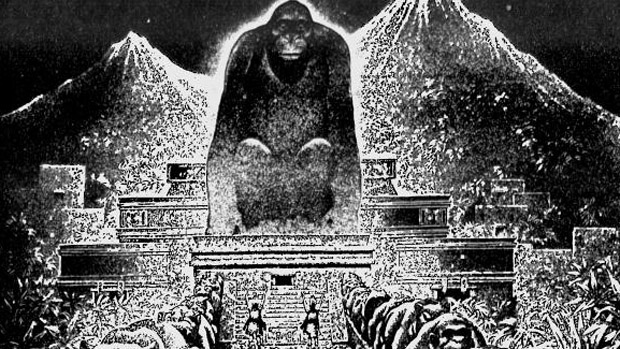City of the Monkey God: have scientists found the lost city?
Archaeologists hunting for an ancient city deep in the Honduran rainforest have made a remarkable discovery

A free daily email with the biggest news stories of the day – and the best features from TheWeek.com
You are now subscribed
Your newsletter sign-up was successful
A team of archaeologists hunting for an ancient city in the Honduran rainforest have discovered the "untouched ruins of a vanished culture", the National Geographic has revealed.
The team of researchers, accompanied by two former SAS soldiers and Honduran troops, discovered a "remarkable cache" of untouched structures, stone sculptures and artefacts which could shed light on the ancient civilisation.
The Week
Escape your echo chamber. Get the facts behind the news, plus analysis from multiple perspectives.

Sign up for The Week's Free Newsletters
From our morning news briefing to a weekly Good News Newsletter, get the best of The Week delivered directly to your inbox.
From our morning news briefing to a weekly Good News Newsletter, get the best of The Week delivered directly to your inbox.
Explorers have been searching for "The White City" or the "City of the Monkey God" deep in the Mosquitia rainforest since the 16th century when Spanish conquistadores arrived in the Americas.
The city's civilisation thrived over a thousand years ago, but has since vanished. Their culture has hardly been studied, and doesn't even have a name.
During an expedition in 1940, the American adventurer Theodore Morde believed that he had discovered the site, but he died before he told anyone where it was. He described a city "where a giant monkey deity was once worshipped and local tribes described myths of half-human, half-simian children."
"It shows that even now, well into the 21st century, there is so much to discover about our world," Christopher Fisher, the lead archaeologist, told the Daily Telegraph.
A free daily email with the biggest news stories of the day – and the best features from TheWeek.com
"The untouched nature of the site is unique and if preserved and properly studied can tell us much about these past people and provide critical data for modern conservation."
The expedition was launched as result of an aerial survey in 2012, which used groundbreaking technology to map the jungle floor, and helped scientists discover vast architectural structures buried underneath the earth.
Nothing has been removed from the site and the location has been kept a secret for fear of looting. "This is clearly the most undisturbed rain forest in Central America," said the expedition’s ethnobotanist, Mark Plotkin. "The importance of this place can't be overestimated."
But the priceless site faces a more immediate threat from nearby deforestation and cattle farming. "To lose this global ecological and cultural patrimony over a fast food burger is a prospect that I am finding it very hard to grapple with," said Fisher.
-
 The week’s best photos
The week’s best photosIn Pictures An explosive meal, a carnival of joy, and more
-
 The ‘ravenous’ demand for Cornish minerals
The ‘ravenous’ demand for Cornish mineralsUnder the Radar Growing need for critical minerals to power tech has intensified ‘appetite’ for lithium, which could be a ‘huge boon’ for local economy
-
 Why are election experts taking Trump’s midterm threats seriously?
Why are election experts taking Trump’s midterm threats seriously?IN THE SPOTLIGHT As the president muses about polling place deployments and a centralized electoral system aimed at one-party control, lawmakers are taking this administration at its word
-
 Epstein files topple law CEO, roil UK government
Epstein files topple law CEO, roil UK governmentSpeed Read Peter Mandelson, Britain’s former ambassador to the US, is caught up in the scandal
-
 Iran and US prepare to meet after skirmishes
Iran and US prepare to meet after skirmishesSpeed Read The incident comes amid heightened tensions in the Middle East
-
 Israel retrieves final hostage’s body from Gaza
Israel retrieves final hostage’s body from GazaSpeed Read The 24-year-old police officer was killed during the initial Hamas attack
-
 China’s Xi targets top general in growing purge
China’s Xi targets top general in growing purgeSpeed Read Zhang Youxia is being investigated over ‘grave violations’ of the law
-
 Panama and Canada are negotiating over a crucial copper mine
Panama and Canada are negotiating over a crucial copper mineIn the Spotlight Panama is set to make a final decision on the mine this summer
-
 Why Greenland’s natural resources are nearly impossible to mine
Why Greenland’s natural resources are nearly impossible to mineThe Explainer The country’s natural landscape makes the task extremely difficult
-
 Iran cuts internet as protests escalate
Iran cuts internet as protests escalateSpeed Reada Government buildings across the country have been set on fire
-
 US nabs ‘shadow’ tanker claimed by Russia
US nabs ‘shadow’ tanker claimed by RussiaSpeed Read The ship was one of two vessels seized by the US military
